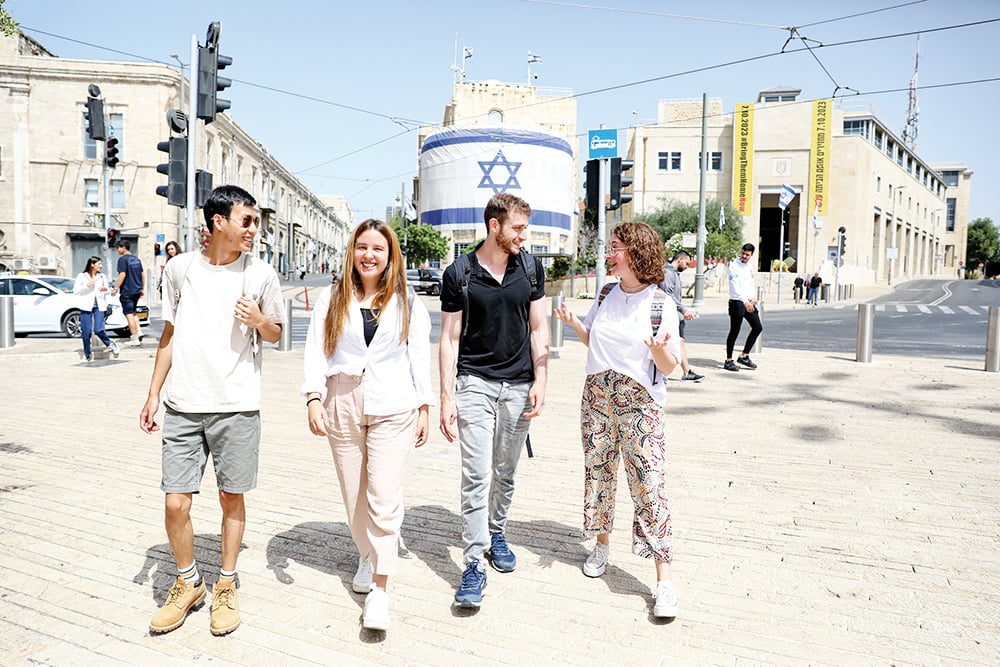
Amid conflict and uncertainty, hope often emerges, inspiring individuals to come together to drive change. What role do academic institutions play in fostering hope? And how do they transform hope into a force for change? As we usher in the new Jewish year, we’re reminded of the enduring power of hope to guide us through challenging times. At Hebrew University, we carry hope forward as a means for change, working toward a more tolerant society, and a brighter tomorrow.
Hope Is the Instrument
Israel’s 10th president, Reuven Rivlin, an alumnus of the Hebrew University of Jerusalem, described the essential role of higher education in shaping Israeli society. “The university is a first meeting place for the various tribes of Israel and it plays a vital role in formulating the new Israeliness.”
Professor Mona Khoury, vice president for strategy and diversity at Hebrew University, emphasized hope’s role in navigating the complexities of this diverse environment. She acknowledged the tensions between groups on campus — secular and religious Jews, Muslim and Christian Arabs, ultra-Orthodox, international students, new immigrants and more — yet believes that hope can emerge from these complexities.
According to Khoury, recognizing differences is central to hope. “The goal is to create a space where individuals can learn from their differences and build mutual understanding. Hope is the means for achieving this. When paired with action, hope leads to meaningful change.”
Khoury believes that dialogue is key. “People are divided over what has transpired since Oct. 7 and we need to encourage discussion.” The university’s diversity unit works to foster this dialogue. “While campuses worldwide are ablaze with intolerance, in Jerusalem we’ve created a safe space for meaningful dialogue. And that’s hope.”
A Tangible Expression of Hope
Rabbi Adi Isaacs, director of Jewish life for Anglo students at Hebrew University’s Rothberg International School and founder of the Nitzavim Program, views hope as deeply intertwined with Jerusalem. For Isaacs, like many, Jerusalem is the ultimate symbol of hope for the Jewish people — a focal point for prayers, aspirations and the yearning for unity. “Studying at Hebrew University, in the heart of Jerusalem, is more than an academic pursuit — it’s a tangible expression of hope,” he said.
Rabbi Isaacs and his team are dedicated to creating a supportive community at Hebrew University, where students can explore their Judaism and be part of the ongoing story of Jewish life in Jerusalem.
Harnessing Hope for Social Action
Dr. Oded Adomi Leshem, political psychologist and founder of “ReHope,” the International Hub for Hope Research at Hebrew University, explored the connection between hope and reality and how it advances social well-being. “Hope is an existential need,” Leshem explained. “It’s our ability to pick up the slightest positive signal in times of distress.”
Leshem described how hope is deeply rooted in the university’s agenda. “Hope occurs when we do something. At Hebrew University we promote science, social mobility and inclusion while nurturing talented young people and investing in a hope-filled future.”
In “Hope Amidst Conflict,” Leshem explored how hope transforms from an abstract idea into a practical tool in crises, driving action. He highlighted Israel’s civilian mobilization since Oct. 7 as an example of hope-driven action. Leshem asserted, “Those who have volunteered understand the power of hope in action. We must now harness this hope as a force for social change.”
The Hebrew University of Jerusalem (HUJI), consistently ranked among the world’s 100 leading universities, is Israel’s premier university and research institution. Founded nearly a century ago by exceptional thinkers like Albert Einstein, HUJI stands at the forefront of groundbreaking research and innovation.
With six campuses, seven faculties, 315 academic departments, and over 100 research centers, HUJI’s world-renowned faculty are recognized by distinguished awards, including eight Nobel prizes. Home to approximately 2,300 international students annually, HUJI offers a broad range of programs, degrees and research opportunities in English.












